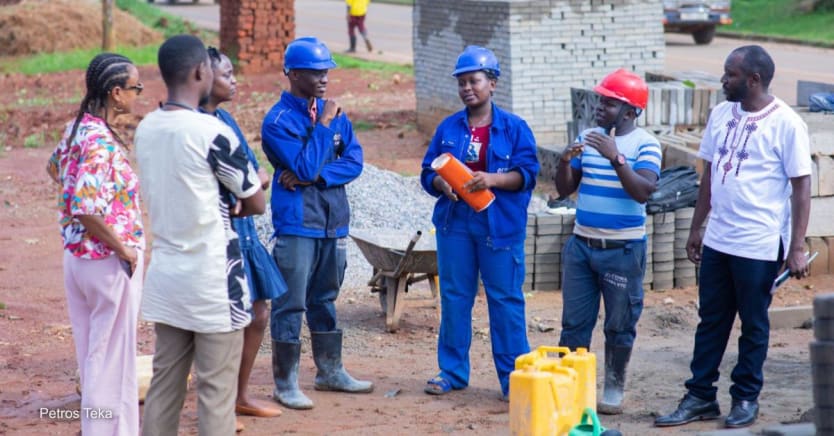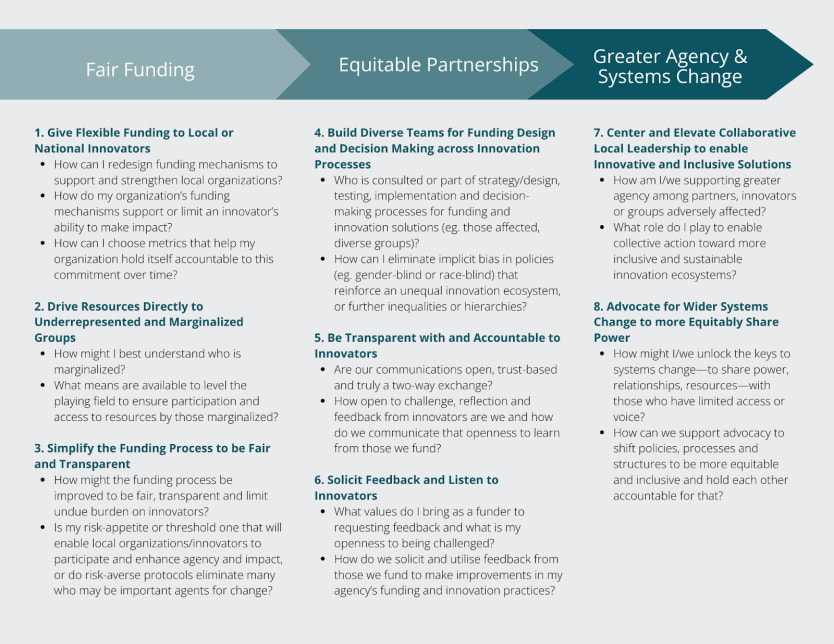
When the African Visionary Fund, or AVFund, accepted the invitation of the International Development Innovation Alliance, IDIA, to serve as the lead learning partner for their equity and innovation work, we saw it as an opportunity to demonstrate an alternative to the often unjust dominant approach to development funding in ways that would center the insights of change-makers and innovators on the ground. In a sector that has historically been slow to change, our goal was to advocate for a transition to equity-centered, trust-based, and participatory funding mechanisms that hold donors accountable for both commitment and action.
Despite international agencies’ documented commitments to adopt equitable approaches to democratizing funding through the Grand Bargain, the Whistler Principles, and the OECD Development Assistance Committee’s recent recommendations framework for strengthening local ownership and partner country civil society, foreign-led and multilateral organizations still receive the bulk of funding at the expense of local, community-centered organizations globally. The evidence is undeniable; only 1.2% of total international humanitarian assistance directly funded local and national partners in 2021, according to the Global Humanitarian Assistance Report, and only 13% of U.S. grant dollars funded local organizations between 2016 and 2019, according to the State of Global Giving by U.S. Foundations report.
Multiple impactful initiatives such as pooled philanthropic funds, which enable trust-based giving, have emerged across the development and philanthropic space to translate localization and power shifting into practice as a response. A recent special report on emerging trends in philanthropy highlights significant shifts towards simplifying funding bureaucracy and transferring decision-making power to local partners for more effective impact. However, the decisions within many purportedly “localized” funding mechanisms about who and what gets funded — and the restrictions that come with these capital resources — still largely continue to reinforce inequalities within local ecosystems and the broader global development funding system. This suppresses the emergence of diverse innovative solutions and directly undermines the sustainable development progress that our sector aims to catalyze.
The Equity Principles and Metrics Framework for Meaningful Localization
It was within this context we engaged in a learning partnership with IDIA, a platform of 14 of the world’s largest development innovation funders. We sought to co-develop an action-oriented initiative towards equitable local innovation investment. For us, localization refers to the practice of driving direct resources to local stakeholders — community members, grassroots organizations, and local governments — so they can lead in the ownership, design, implementation, and evaluation of contextually relevant development efforts. We align with the African Philanthropy Forum’s conceptualization of an “African NGO” to define locally led development using criteria such as the geographic location of organizations’ headquarters, an in-country leadership team that mirrors the demographics of the community or region they serve, decision-making power in the hands of locally rooted board members, and community engagement and reinvestment as integral parts of the operating model.
In this exploration, we were joined by our Systems Change Strategist Sibabalwe Mona; co-Chair of the O’Neill-Lancet Commission on Racism, Structural Discrimination and Global Health Ngozi Erondu-Manyonganise; and four IDIA global innovation advisers — Paula Kiura, Johanssen Obanda, Mishal Khan, and Mahfuza Mala. IDIA members UNICEF, Grand Challenges Canada, the Rockefeller and Skoll Foundations, the Global Innovation Fund, Global Affairs Canada, and Results for Development invested in the advancement of the initiative.
“[Localization] must be mainstreamed as a field-wide practice, instead of being dismissed as a hot topic that will fizzle with time … The field's ability to maximize lasting, impactful change depends on it."
—The outcome is the Equity Principles and Metrics Framework for Meaningful Localization, co-created and tested with nearly 200 country-based innovators, change-makers, and activists from Africa, Asia, Latin America, and the Caribbean representing diverse grassroots, local, national, regional, and global organizations. The framework highlights three interconnected themes: fair funding practices, which contribute to more equitable partnerships, which in turn contribute to greater agency of local change-makers to secure systems change. Under these three themes, the framework presents eight principles prioritized by change-makers for power-sharing, recommended institutional and individual actions for donors and desk officers, and tangible metrics for accountability.

Meaningful localization in practice
GIZ’s Innovation Unit, aligning with principle 1’s call for flexible funding, is setting up a new innovation management process that will explore new financing mechanisms for innovations throughout 2024, including investigating more flexible funding approaches for local and national innovators, and seeking more diverse applicants and grantees. In line with principle 4, recognizing the need to go beyond a human-centered design approach to one rooted in inclusion and locally led development, in April 2024, the GIZ Innovation Unit is launching a toolkit for scaling innovation that provides guidelines for building diverse teams for decision making across innovation processes.
All these principles guide our work at the African Visionary Fund. As an intermediary, we exist to provide unrestricted, trust-based, multiyear funding to chronically underfunded, African-founded, and led organizations. Our funding is rooted in an equal partnership that allows our portfolio partners the flexibility to allocate resources where they are most needed, empowering them to address organizational challenges and seize impact opportunities as they arise. Indeed, our partners cite our flexible grantmaking model as pivotal to their successes in 2023; 85% of respondents to our recent annual partner learning survey reported utilizing AVFund resources for self-identified capacity-building projects, resulting in improved organizational efficiency and effectiveness without the pressures of prescriptive growth models. Seventy-one percent of our partners reported expanded, scaled, or newly launched programs, reaching more beneficiaries and achieving significant impact. The rest chose to invest in organizational resilience, financial sustainability, and other priorities that they defined without donor influence. Our grants have enabled our partners to exert greater agency in their strategic direction, and breathing room to shift to a longer-term, systems focus.
The Indigenous Innovation Initiative, or I3, is hosted at Grand Challenges Canada and is intentional about its reach by driving resources to underrepresented groups — principle 2 — in support of intersectionally marginalized Indigenous innovators and enhancing agency — principle 7. The I3 team and GCC embody fair funding and equitable partnerships by taking on the administrative burdens and knowledge translation to advocate for changes to bilateral compliance practices, translating innovator mission and priorities to Western reporting standards — principle 6. These efforts enable Indigenous innovators to focus on solutions that are most meaningful to their communities — in support of principle 4.
Our mission is grounded in a deep-rooted belief that locally led organizations are best positioned to deliver impact in all sectors. We are committed to advocating for resourcing change-makers in a way that centers their mission and vision over funders’ sectoral agendas, projects, and burdensome bureaucratic practices. Local organizations’ ability to invest in themselves on their own terms, coupled with having visibility and access to new networks, helps them attract more flexible funding. To date, the African Visionary Fund has leveraged our connections to other funders to help secure $5.6 million in new funding for our portfolio partners through fundraising support, introductions, and referrals. Two-thirds of this leveraged funding is unrestricted.
The AVFund is constantly experimenting, learning, and evolving our own practices based on the discoveries we make as we immerse ourselves in the African social impact and development landscape and uncover the severity of the funding drought that defines it. These changes include strategically expanding our eligibility criteria to be radically inclusive of a diverse intersection of organizations in the near future, especially those excluded or abandoned by ever-changing funder interests.
In this spirit of reflection and reevaluation, the institutional practice examples presented in the framework are designed to challenge us all to iterate our funder programs and processes based on new knowledge. They are designed to demonstrate that progress toward fairer funding, more equitable partnerships, and localization that supports greater organizational agency for systems change is possible — even within the current inequitable system, and even as we dismantle it for a better one.
UNICEF’s Venture Fund highlights principle 2 through identifying, piloting, and growing open technology solutions that result in benefits for children and youth and consistently expanding the diversity of in-country innovators supported by the fund. The entire process fosters diversity, equity, and inclusion, and tries to bridge the funding gaps for those often excluded from traditional venture capital — principles 3 and 4. It also supports principle 7 by focusing on and elevating local leadership of a diversity of entrepreneurs from emerging markets, and connecting them with hubs and resources led by local innovation ecosystems. Notably, 43% of all startups supported by the fund, are either founded or led by women — 10 times the industry average — and they account for 64% of total additional investment secured by the fund's investees.
The biggest takeaway of our exploration is the recognition that effective localization will not happen without accountability. This framework offers examples of institutions and networks across the globe moving towards more meaningful localization practices and begins the work of collating sample equity metrics that global and local funders are exploring to ensure they fulfill their localization commitments. These examples and metrics are encouraging and energizing, and our aim is to further coordinate efforts for learning and knowledge sharing between more donors and across more donor networks.
The Global Innovation Fund’s Gender Equity sub-fund pursues principle 2 of driving resources to underrepresented and traditionally marginalized groups, which exceeds the fund’s target investment in locally headquartered organizations, demonstrating that making localization intersectional strengthens localization practice. Additionally, GIF furthers principle 8, advocating for wider systems change to more equitably share power through a practical impact methodology that tracks gender equality, empowerment, and agency as priority outcomes to make the case for increasing intersectionally localized investment that drives resources toward women’s empowerment.
Localization is not an end in itself, and its success isn’t merely quantitative using ambiguous definitions of how many “local” partners are resourced. Meaningful localization requires a collective effort of reimagining the international development status quo. It must be rooted in shared accountability, and defined and co-designed by the local change-makers, visionaries, innovators, and communities closest to the issues and impact. It must be mainstreamed as a field-wide practice, instead of being dismissed as a hot topic that will fizzle with time. We invite you to adopt the principles and recommendations that have been prioritized by partners in this framework, and continuously listen, learn, and adapt as you integrate them into your localization practice. Our role as funders must be to recognize that local and national organizations’ proximity to their communities is critical and valuable — just as valuable as monetary resources — in solving the world’s development problems, and thus, to shift the responsibilities of development efforts toward them. The field’s ability to maximize lasting, impactful change depends on it.
This opinion article has been authored with contributions from the UNICEF Office of Innovation, Grand Challenges Canada, Global Innovation Fund, GIZ Innovation Unit, and Results for Development.
Dig into Roots for Change, a series examining the push towards locally led development.
This piece is sponsored by UNICEF as part of our Roots for Change series. Click here to learn more.










